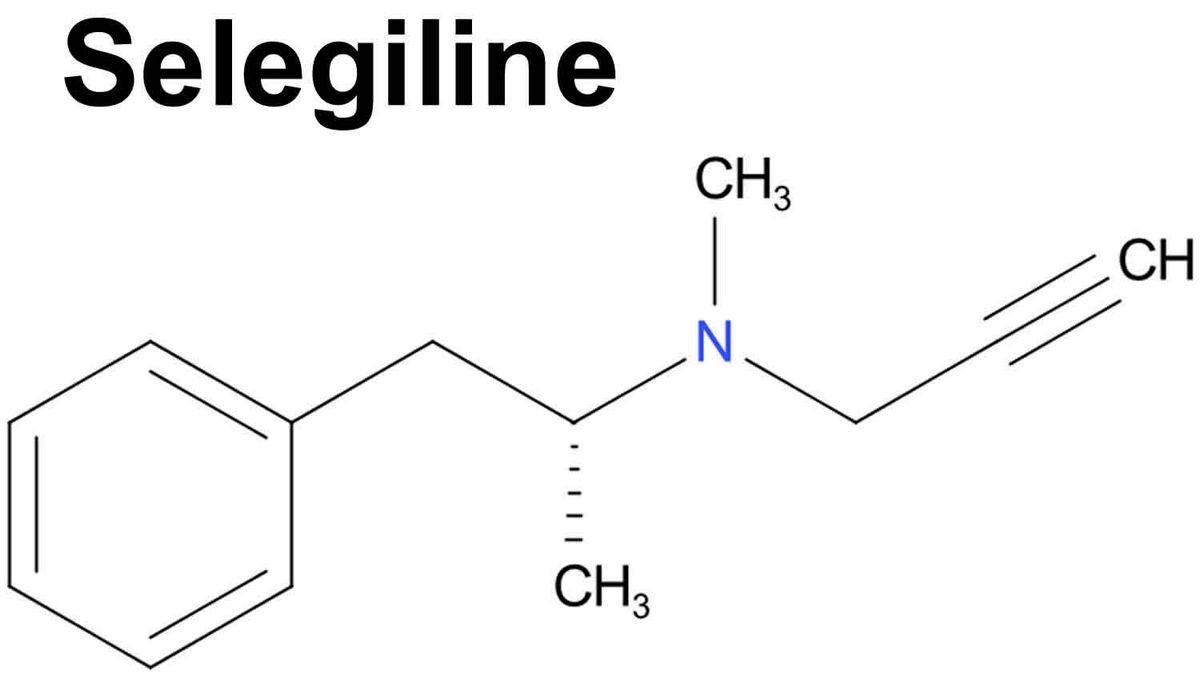
Contents
Selegiline
Selegiline is used as an adjunct in patients treated with levodopa/carbidopa, whose response to these medications has deteriorated. Selegiline is an antiparkinson agent that belongs to a class of medications known as monoamine oxidase type B (MAO-B) inhibitors.
Dopamine is a neurotransmitter in the brain that regulates movement, learning, memory, cognition, and emotion. Parkinson’s disease symptoms are primarily from damage to dopamine-producing neurons in the brain, which causes dopamine levels to drop. Selegiline prevents the breakdown of dopamine, increasing its concentration in the brain.
Selegiline inhibits monoamine oxidase, an enzyme involved in the degradation of dopamine, serotonin, and norepinephrine. At recommended doses for Parkinson’s disease, selegiline selectively inhibits MAO-B in the brain, which primarily breaks down dopamine. At higher doses, selegiline also inhibits MAO-A, increasing serotonin and norepinephrine levels.
Warnings
- Do not use in patients with hypersensitivity to selegiline or its components.
- Avoid using selegiline with opioids, other MAO inhibitors, St. John’s Wort, cyclobenzaprine, or dextromethorphan.
- Use caution with antidepressants as they may cause serotonin syndrome.
- Hypertensive reactions to foods containing tyramine have been reported.
- Monitor for new onset or exacerbation of hypertension.
QUESTION
What are the side effects of selegiline?
Common side effects of selegiline include nausea, vomiting, oral inflammation, swallowing difficulties, tooth disorder, indigestion, abdominal pain, gas, constipation, diarrhea, dry mouth, dizziness, headache, involuntary movements, impaired coordination, drowsiness, insomnia, hallucination, and mood changes.
Call your doctor immediately if you experience serious heart symptoms, severe headache, severe nervous system reaction, or serious eye symptoms.
This is not a complete list of side effects. Contact your doctor for medical advice about serious side effects or adverse reactions.
What are the dosages of selegiline?
Tablet
Capsule
Tablet Disintegrating
Adult:
- 5 mg orally at breakfast and 5 mg at lunch (10 mg/day)
- Taper levodopa dose by 10-30% after 2-3 days of selegiline therapy
- Not to exceed 10 mg/day
Orally-disintegrating (with levodopa/carbidopa)
- Initial 1.25 mg orally every day, may increase after 6 weeks if inadequate response, no more than 2.5 mg/day
- Do not swallow, take in the morning without ingesting food or liquids for 5 minutes before and after taking medication
Dosage adjustments are not provided for certain conditions. Use caution with hepatic or renal impairment.
Overdose
- Overdose of selegiline may cause restlessness and severe low blood pressure.
- Selegiline overdose can inhibit both MAO-A and MAO-B, resulting in symptoms such as drowsiness, dizziness, irritability, hyperactivity, hallucinations, convulsions, coma, rapid and irregular pulse, high blood pressure, respiratory depression, and cool, clammy skin.
- Treatment includes induced vomiting, gastric lavage, charcoal administration, airway maintenance, respiratory support, intravenous fluids, and medications based on symptoms.
What drugs interact with selegiline?
Inform your doctor of all medications you are currently taking to avoid possible drug interactions.
- Selegiline has severe interactions with at least 60 different drugs.
- Selegiline has serious interactions with at least 43 different drugs.
- Selegiline has moderate interactions with at least 109 different drugs.
- Mild interactions of selegiline include ruxolitinib and ruxolitinib topical.
Always consult your doctor before making any changes to your medication regimen.
What else should I know about selegiline?
- Take selegiline exactly as prescribed.
- Report to your physician immediately if you experience symptoms of hypertension, drug reactions, Parkinson’s symptom changes, or behavior and mental status changes.
- Be aware of increased urges for intense behaviors that you are unable to control.


